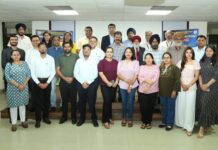Short-Term Course on Mastering Poster Design: From Basic to Advanced Techniques was organized by Human Resource Development Center and School of Liberal and Creative Arts (Fine Arts), LPU. The resource panel included Dr. Rohita Sharma, Professor, Head-Department of Fine Arts, School of Liberal and Creative Arts, Lovely Professional University, and Ms. Apoorva Lall, Assistant Professor, School of Liberal and Creative Arts (Fine Arts), Lovely Professional University.

Day 1: Dr. Rohita Sharma introduced participants to the basics of poster design, covering core elements such as layout, typography, color theory, and visual hierarchy. She emphasized on structuring layouts to guide viewers’ attention, using typography to enhance readability and set the poster’s tone. Participants learned to apply color theory to evoke emotions and highlight important details. Dr. Sharma also explained visual hierarchy, showing students how to arrange information by importance to create a natural flow. The learning from day one equipped the participants with essential skills to craft visually appealing, effective posters that communicate their messages clearly.

Day 2: Ms. Apoorva Lall concentrated on the development of advanced design principles, with a particular focus on typography and color theory. Her work emphasized the nuanced creation of visual elements, beginning with sketching and shaping fonts to ensure a cohesive and effective design. She meticulously used fonts, refining their form to ensure that they not only meet aesthetic standards but also enhance readability and impact. Her approach combined both technical skill and creative vision, aiming to elevate the overall design through carefully crafted typographic and color choices.
Day 3: Ms. Lall introduced essential design tools, emphasizing their functionality and application in modern design practices. She also explored artificial intelligence (AI) as a significant, emerging trend in art and design, highlighting how AI-driven tools are transforming creative processes and expanding the possibilities for innovative design solutions.

Day 4: Ms. Lall presented “Communication through the Ages” as a case study, exploring how communication has evolved and its influence on design practices across different eras. This case study provided insights into the changing tools, methods, and mediums that have shaped how ideas are conveyed visually and verbally. Following this, she led activities focused on concept development, encouraging participants to generate, analyze, and refine their ideas. These exercises aimed to improve their conceptual clarity and helped them in transforming initial thoughts into well-structured, compelling design concepts.

Day 5: Ms. Apoorva Lall led a comprehensive discussion focusing on hands-on design, where participants engaged directly with practical design techniques to strengthen their skills. She also explored storytelling and narrative through typography, demonstrating how type can be a powerful medium for conveying emotions and enhancing narratives within a design. Additionally, she provided valuable tips for effective presentation, guiding participants on structuring their ideas clearly and showcasing their work compellingly to leave a strong impact on their audience.
Day 6: The final phase of the course included an action learning project- exhibition of artwork created by the participants, highlighting the wide range of skills and techniques they had developed throughout the course. This exhibit allowed participants to present their individual styles and demonstrate their creative progress, underscoring the practical results of the training. After the presentation participants completed a set of MCQs to for assessment of learninig outcome attainement. Feedback was taken from participants to evaluate the impact of the program and get valuable insights for future enhancement.

Short Term Course on Mastering Poster Design: From Basic to Advanced Techniques
“Mastering Poster Design From Basic to Advanced Techniques” helped the participants in gaining a nuanced and comprehensive understanding of human behavior and social phenomena. Its flexibility, depth, and participant-centered approach made it a valuable tool across various disciplines.

The feedback indicates that participants not only understood the core principles behind poster design but also acquired the hands-on skills necessary for applying them. The emphasis on both conceptual understanding and practical application ensured a comprehensive learning experience, which participants felt would positively impact their work in mastering poster design.



















